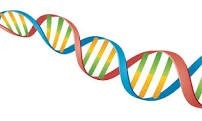Parshas Re’eh
Change Your DNA for Worse or for Better!
“But make sure that you do not partake of the blood …. you must not partake of it, in order that it may go well with you and with your descendants to come.” (Devarim 12:23, 24) “You must surely strike down the inhabitants of that city by the sword; annihilate it and everything that is in it, and its livestock by the sword…. so that Hashem withdraws His raising fury and grant you mercy, and He will be merciful toward you.” (Devarim 13:16,18)
Rabbi Chaim Volozhin zt”l (Ruach Chaim as quoted in Artscroll Bereishis) says that our forefather Avraham developed wonderful traits as a result of passing the Ten Tests. Our forefathers bequeathed to each of us a magnificent legacy of their middos, character traits, from their spiritual DNA to ours. There have been Jews who, despite not being very religious, were willing to risk their lives to sanctify Hashem’s name. Their trait of self-sacrifice was inherited from Avraham’s willingness to allow himself to be thrown into a fiery furnace rather than renounce his faith in Hashem. Our longing to settle in, or at least visit, Eretz Yisroel came from Avraham’s willingness to leave his homeland to travel to Eretz Yisroel. We also inherited from Avraham the trait of acceptance of all that Hashem does is for the best. So too, when any tzaddik works hard and achieves character perfection, those positive characteristics are inherited by his children.
The Torah says that after ritually slaughtering an animal to eat its meat, it is forbidden to eat the blood of the animal (Devarim 12:23-25). You must not partake of it, “in order that it may go well with you and with your descendants to come, for you will be doing what is right in the sight of Hashem” (Devarim 12:25). Rav Yonason Eibschutz zt”l (quoted in Iturei Torah by Aharon Yaakov Greenberg) asks, why the Torah specifically says by this mitzvah, of not eating the blood, “in order that it should be good for your descendants”. What is the connection to your descendants when you eat the blood of an animal? Rav Yonason Eibschutz zt”l answers that blood is forbidden to eat because it dulls the heart and influences a person to cruelty. The cruelty will then be passed in the spiritual DNA from father to son. That is why the pasuk says not to eat the blood “in order that it be good for you and your descendants”. This is to protect your descendants from bad character traits which would otherwise have been passed down to them.
If an entire city served idols, the entire city was destroyed. All the inhabitants and even the animals had to be killed. The entire city and all the booty in it, was then burned. The city was never allowed to be rebuilt.
The Chofetz Chaim zt”l (Chofetz Chaim on the Torah) says that habit becomes second nature. For example, if one is in the habit of doing acts of kindness, being a kind person will become one’s second nature. The same would apply to all midos, both good and bad. That habit would become second nature. If so, then wiping out such a city presented a serious challenge to the soldiers who were following this mitzvah. The Jewish soldiers who would be fulfilling the mitzvah of wiping out such a city would be killing many people. The act of killing would become second nature to them. The soldiers would then thirst for blood and become murderers. To counter that, Hashem promises, “He [Hashem] will be merciful toward you”. Hashem will replace the feelings of mercy that the soldiers lost while performing this mitzvah. They will then be as merciful as they had been previously.
For this reason, the Chofetz Chaim zt”l expressed his concern for the Jewish soldiers who returned home after the first World War. He feared that they would become murderers because the sensation of murder had been implanted in their hearts from the battles that they had fought.
Rav Chaim Shmuelovitz zt”l (Sichos Mussar תשל”ג, page 141) says that when Sodom was destroyed, Lot’s daughters thought that the rest of the world had been destroyed and that they and their father were the only survivors. To populate the world, each of them had relations with their father. Each gave birth to a son. The elder daughter who initiated this behavior, named her son Moav. This genetic DNA, of immorality, was passed down to her descendants. Years later, it was the daughters of this nation, Moav, whose immorality caused the death of 24,000 Jews. Rav Chaim Shmuelovitz zt”l asks how is it that it seems from the Talmud that the daughters were praised for their actions of immorality? The Talmud (Nazir 23A) praises Lot’s elder daughter whose intentions were for a mitzvah, and for which she was rewarded. Rav Chaim Shmuelovitz zt”l answered that even though their intentions were praiseworthy and were considered a big mitzvah, an inclination towards promiscuity was established in her family. In later generations, that tendency led to and became a promiscuity of sin. The act of Lot’s daughter was not done for the sake of immorality but for the sake of Hashem. However, in later generations it blossomed into total immorality.
Parents are happy when their children are successful (Obviously, there are different perspectives for the definition of success). It is a great nachas when parents see that children are even more successful than them. No loving parent would do something to harm a child or place an impediment to his success.
That is one reason why it is so important for us to actively work on the positive development of our middos. The middos that we develop may be transferred to the spiritual DNA of our children and all our future generations.




